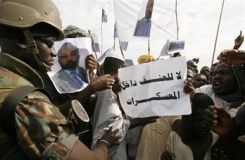Darfur displaced say peace talks doomed to failure
October 26, 2007 (AL-SALAM CAMP, Sudan) — A day before Darfur peace talks are due to open in Libya, many victims of the 4-1/2 year conflict in Sudan’s remote west have already doomed them to failure.
 While more than a dozen Darfur rebel groups jockey for power at the negotiating table in Libya, Darfuris at the Al-Salam Camp say the one rebel they trust will not be among them.
While more than a dozen Darfur rebel groups jockey for power at the negotiating table in Libya, Darfuris at the Al-Salam Camp say the one rebel they trust will not be among them.
Sudan Liberation Army (SLA) founder and Chairman Abdelwahid Mohamed al-Nur commands almost unanimous support in Al-Salam and many of the camps housing more than 2 million people who have fled homes and villages destroyed in the fighting.
Nur’s refusal to go to the U.N.-African Union mediated talks until a U.N. force deploys to stop rape, looting and murder in Darfur has earned him almost blind support among those who suffered most after his group rose up against the government.
“He’s (Nur) not going because we don’t want him to be there,” said Ahmed Etim Osman who watched 13 members of his family executed by militia in 2004 before fleeing his home to the camps surrounding Darfur’s main town el-Fasher.
“I can still see the faces of the men who did it,” he said. “I was in the next hut watching through the window. I could see them but they couldn’t see me.”
While Nur has few troops on the ground, he commands huge support among his Fur tribe, the largest in Darfur. But his support also crosses tribal lines. Osman is from the Tunjur tribe.
“Libya is the wrong prescription for Darfur’s disease,” Osman said.
“PAID FOR ABUJA”
Mostly non-Arab rebels declared war on Sudan’s central government in 2003 accusing it of neglecting the remote west.
International experts estimate some 200,000 people have died and the world’s largest aid operation is helping almost two-thirds of Darfur’s population now affected by the violence.
After a 2006 peace deal signed in Nigeria between Khartoum and one of three rebel negotiating factions, tensions worsened and rebels split into more than a dozen groups, seeming to care more about power than the people they were supposed to liberate.
“If talks go ahead in Libya it will cause more suffering. We paid for what happened in Abuja,” Osman said.
Al-Salam was a planned camp to provide refuge for the ever increasing numbers fleeing their rural homes, but the conditions are far from good. Birds of prey circle ominously above piles of rubbish and the smell of overflowing latrines hangs in the air.
Hafiz Idriss Adouma, also from the Tunjur tribe, said all the smaller factions mediators invited to the talks represented only themselves, not the people of Darfur.
“Other than the Justice and Equality Movement (JEM) and the Sudan Liberation Movement (Nur) we don’t want them. Nobody else should be there,” he said.
Another man who had been shot four times, including once in the head, said he supported Nur not only because he was from the same Fur tribe, but because Nur was the only rebel articulating through the media the true demand of his people.
“I’ve never met Abdelwahid but when I hear him his opinions are our opinions,” said the man who was too frightened to give his name.
He said people wanted compensation, security to return home, militias disarmed and their villages to be rebuilt.
TRUTH, HONESTY
All the male members of Aaliyah Adam’s family were killed after she said government and militia attacked her village.
“My three brothers were killed in front of me in our hut,” she said. But because of constant bombing by planes and militias looting, their bodies remained in the tiny room with them for three days before they could bury them.
She’s convinced Nur, who lives in Paris, is the only one the international community will listen to. “He’s not outside enjoying a luxury life. He’s asking for our rights.”
Aziza Abdallah, 24, from the Zaghawa tribe said she used to support Nur’s rival, SLA leader Minni Arcua Minnawi, who signed the 2006 deal with Khartoum.
But 18 months since the deal, she is disillusioned with any peace process.
“The war has continued as it did before the deal,” she said. “The peace process depends on the truth and honesty of those sitting to negotiate,” she said.
“Now I only believe in the U.N. human rights workers,” she said adding, now she doubts the integrity of any group sitting in Libya.
(Reuters)
